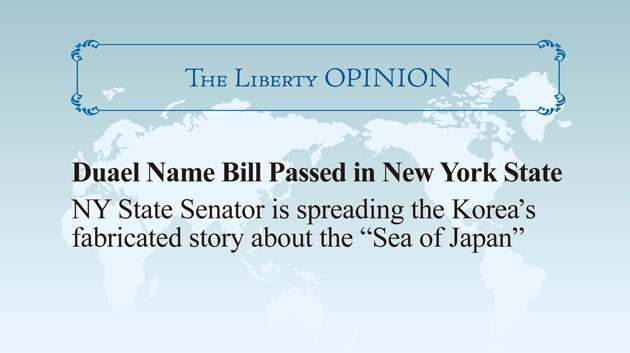Dual Name Bill Passed in New York State
NY State Senator is spreading Korea's fabricated story about the "Sea of Japan"
The New York Senate passed a bill recently that would require school textbooks to use both the Sea of Japan and the East Sea to refer to the body of water between Japan and South Korea. A similar bill was also enacted in Virginia in April, and the dual name issue is spreading all over the U.S., Sankei Newspaper reported on May 9th.
Democratic Senator for the State of New York, Tony Avella, who sponsored the bill said, “Both Korea and China have referred to this same body of water as the “East Sea” for well over 2,000 years,” or “I took the side of Korean Americans, not Japanese Americans.” He represents a heavily Korean constituency, and his move apparently is based on close ties with his constituency, which is, of course, not surprising. We only wish he would keep an open mind and not simply accept information that may be biased or historically inaccurate in his desire to keep his district happy and continue to win their votes.
Senator Avella also appears to be taking the side of South Korea regarding the issue of the “comfort women” as well. The June issue of Liberty carries an interview with Senator Avella concerning the “comfort women”. During the interview, he spoke to us about “Conversing directly or talking via Skype with former comfort women has led me to believe that they were actually victims of sexual slavery.” He relied only on the verbal evidence of Korean women who claim to be former “comfort women” and accepted their past and disclosure to their families.
Regarding the bill on the Sea of Japan, Senator Avella apparently accepts what South Korea claims. Many other legislators who voted for the bill did not seem to base their judgment on objective evidence. The name “Sea of Japan” is the only internationally established name for the oceanic area in question, and the U.S. government as well as many international bodies, including the United Nations, share Japan’s position. The Ministry of Foreign Affairs of Japan counters Korea’s argument on its own website.
South Korea claims that the name “East Sea” has been used continuously for the past 2000 years, but it was not until 1992 that it formally raised objections to the name “Sea of Japan.” It asserted that the name Sea of Japan became widespread as a result of Japanese expansionism and colonial rule. According to the Japanese government’s survey, however, the name “Sea of Japan” was already prevalent by the early 19th century — well before Japan’s annexation of the Korean Peninsula in 1910.
Korea insists that the survey of historical maps uses the name “Oriental Sea” and “Sea of Korea” (or “Korea Sea”) to refer to the “East Sea,” but those two names have completely different origins and meanings. By claiming that they refer to the “East Sea,” South Korea is trying to fabricate the evidence that the “East Sea” has been used historically.”
The Korean community in the U.S. is steadily lobbying legislators of other states with the same misleading stories. The Japanese government must appropriately voice its dismay with its U.S. counterpart, while at the same time paying close attention to the movement of local government and taking necessary measures.
We count on the United States to keep an open dialog so that these issues can have a fair resolution based on what is right, not just what is politically expedient.



















